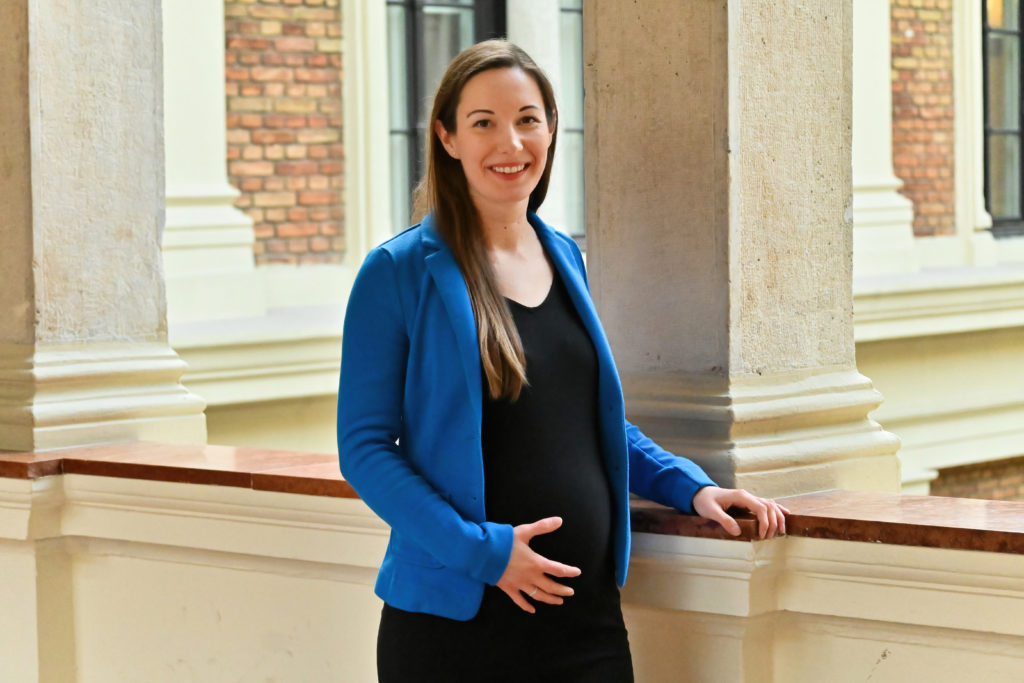‘Research and education go hand in hand’ – The PhD Story of Ágnes Meleg

Ágnes had to walk down a winding road before she reached the Doctoral Programme in Economics, Business and Informatics. In the bachelor programme, she studied tourism and hospitality, and in the master programme she studied finance, while working all the time. ‘These changes in directions were greatly influenced by my jobs’, she explained. After the master programmes, she ended up studying business informatics owing to changes in positions. Earlier she did not attend the Corvinus, so this relation is due to an accident. ‘At the company, where I was working at that time, I had the opportunity to go to the Corvinus as a guest lecturer, to deliver a lesson in business informatics. After that, I started to talk to the lecturer of the programme about studies, and I was encouraged to attend the doctoral programme. Now that person is my supervisor’, said Ágnes.
Life-long learning
The young researcher has always loved studying, and realised that she would be happy to develop further in the field of business informatics. ‘The idea that you can do something useful for yourself motivated me to start the doctoral programme’. As opposed to most of the tasks at companies, students are able to implement their own ideas during the programme. Naturally, this generates some difficulties, too. ‘The doctoral programme is completely different from a bachelor or master programme, and from a workplace environment, too. It takes time to find your place’, says Ágnes, who has been doing the programme in parallel with her work. The supporting environment at home, at work and at the university helped a lot in maintaining the work-life balance.
At the beginning, at the University, she found that the mandatory subjects provided the greatest help. ‘One of my objectives was learning. I am a typical case of lifelong-learning’. In addition, the community also played an important role in the fact that by the end of the fourth year, her draft thesis is almost ready, and she hopes to defend it within a few months’ time. ‘Although I am working alone in the doctoral programme, when I say I need help, we are able to cooperate with the colleagues’. Besides, the University provides infrastructural background, too, to PhD students. Ágnes pointed out that software programmes and literature databases required for the research helped her a lot in research.
Apart from research and education, she has been involved in teaching, too, over the past years. ‘They supported me in what I felt comfortable. I actually love teaching, so I have been teaching at the university since the second year’. Ágnes is now a Master Lecturer, and her teaching activities are very close to her research topic.
Competence assessment with business simulation method
In secret, she has always wanted to be a teacher, so she felt that learning analytics was close to her already at the time of applying for admission to the doctoral programme. This field covers the analysis of data related to students. ‘The PhD is good, because it can cover adjoining territories. While the bachelor and master programmes have clear-cut scopes, PhD researches can be multidisciplinary. My topic is like that, too’, explains Ágnes. By reading a lot of literature and visiting conferences, she found where she could present something new. ‘In parallel with that, there was a demand for competence assessment at the University, too’, so she started to work on that topic.
Over the past years, in cooperation with her fellow researchers, she has worked out a competence assessment for graduating students of business informatics, whom she taught, as well. ‘This way I got to know the class and the requirements better. In my case, research and education go hand in hand’, she said, smiling. The survey is based on a regulation, which controls the training and output requirements of the programme in Hungary. ‘It shows what expertise and special competencies you are expected to have when you complete the business informatics programme’, explains Ágnes. In addition, she has utilised her business experiences, too. She found that there are certain competencies that are essential, regardless of the technical area: communication, creativity, collaboration and critical way of thinking. ‘We developed a comprehensive assessment system that allows us to measure both profession-specific and general skills at a certain level’.
Graduating students took part in a three-hour on-line simulation, in which they had to solve tasks both individually and in teams. The idea was to simulate a business environment for them, where they can test themselves. ‘In this simulated environment, they work as business informatics consultant colleagues, and receive various requests from the clients, and we tried to set it up a fairly realistic way. This way students can see what to expect after university’.
In the course of analysing the results, we identified the fields to be improved and the strengths, and it was possible to group students with the help of cluster analysis. The assessment may offer some feedback to programme leaders and lecturers, and allows students to get to know each other better. The simulation was held twice, so altogether 160 students took part in Ágnes’ research. ‘Their feedback was positive. It was clear that they appreciated the possibility of taking part in an innovative assessment’.
International communities and every-day roles
It was not only the participants of the research, but the international research community, too, that gave feedback to Ágnes over the past years. ‘When you start to work on a particular topic, it is worth watching the conferences and grab the opportunities’. It was a Spanish conference that the young researcher first attended, and in the following year, she returned as a speaker. ‘We have a very receptive learning analysing community’, where Ágnes – owing to her speaking Spanish – was able to fit in.
In the meantime, she has found the conference that is globally the most important event in her field. She thinks it has been her greatest success so far that she was able to travel to Texas, and attend that conference in March. ‘This is a big thing, because altogether twelve doctoral students were invited from the whole world’. The organisers paid special attention to the student community, and arranged for financial support for them, too. The poster section allowed her to meet even more researchers.
As a result of all these experiences, Ágnes thinks she is not the same person she would be if she had not started the doctoral programme. Her professional skills have improved a lot, for instance her knowledge about data analysis, and so have her presentation skills and time management. ‘The fact that you have a lot of ‘hats’ to wear develops your personality in a very interesting way. I am a student, a researcher, a lecturer, a manager at the company I work for, and now a mother, too. Several of these roles are given by the doctoral programme’, says Ágnes, who is expecting her baby by the summer. ‘I hope that I will be able to defend my draft before the arrival of the baby’, she said, smiling, at the end of the conversation.
Written by Tünde Taxner
